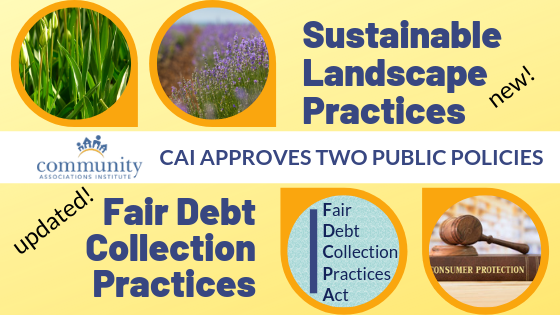The CAI Board of Trustees approved a new public policy on sustainable landscape practices and updated an existing public policy on fair debt collection practices at the CAI Annual Conference and Exposition in Orlando.
Sustainable landscaping practices. Drought conditions in the West and South and community association covenants have collided, creating legislation that provides for a more limited framework for associations to consider as they amend, draft, or enforce landscaping related covenants that cover types of plants/foliage/landscaping and requirements to maintain landscaping.
CAI supports legislation that permits the association to enact reasonable rules and regulations concerning landscaping requirements.
Community associations must maintain the ability to impose a monetary penalty for noncompliance with landscaping covenants. However, associations should refrain from imposing penalties on homeowners for failing to water during a government-declared drought. Water-use policies should focus on proven ways to reduce the need for watering while maintaining the level of aesthetics valued by the community.
Further, community associations should not adopt rules explicitly prohibiting xeriscaping or the use of drought-tolerant vegetative landscapes. Association guidelines should provide an accessible means for homeowners to seek landscaping variances, and committees or boards are encouraged to approve common sense requests that also maintain aesthetic standards. Covenants also should provide for adjustment during times of drought and protect homeowners who implement sustainable practices from adverse policy changes.
Sustainable landscaping practices are encouraged, especially in geographic areas with desert-like topography or prone to drought. Community associations should evaluate the amount of water used to sustain the landscaping.
Fair debt collection practices. Claims of Fair Debt Collections Practices Act (FDCPA) compliance-related issues against community association boards, managers, and their legal counsel became increasingly prevalent following the 2008 housing crisis. A subset of these claims was initiated by law firms seeking lawsuits and claims of potential ministerial non-compliance of the FDCPA when collecting community association assessments. During this time, federal legislation was introduced proposing changes to the FDCPA to exempt attorneys from the law. The CAI Federal Legislative Action Committee conducted a focus group of community association lawyers to discuss the issue and legislation.
CAI opposes duplicative legislation at the state level that imposes state penalties for violations that are already incorporated within the FDCPA.
CAI supports legislation that accomplishes any of the following:
- The exemption of association attorneys and community managers from the FDCPA or any similar state laws that impose unduly burdensome requirements in collecting monies owed to community associations.
- The elimination of penalties and attorneys’ fees for technical or procedural violations that cause no damages to a debtor.
- The elimination of community association assessments as “consumer debt” under the FDCPA or any similar state laws.
Although courts have interpreted the language of the FDCPA to include assessment debt as consumer debt, CAI urges its members to educate legislators on the similarity of assessment debt to local governmental taxes and ultimately seek the statutory removal of association assessments as consumer debt under all relevant consumer debt protection laws.
Click here to view the new Sustainable Landscape Practices public policy or the updated Fair Debt Collections Practices



